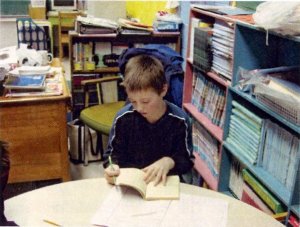
Literacy research suggests that boys do not engage in literacy outside of school in contrast to girls. Thus it is important for the boys to have literacy experiences in school. Reading for pleasure is associated with reading achievement. The boys in our study along with the girls reported that they liked the male mentor reading program. Reading a variety of reading materials is also associated with higher rates of literacy. The children's feedback reflected their awareness of a great number of genres and those they liked best.
The time spent doing literacy was also significant. The mentors spent 30 - 40 minutes a week in the same classrooms for fourteen in school months. During these sessions, children had access to books they were interested in and were influenced by males who were role models. Mentoring programs that are informal, yet in school such as the male mentor reading program can be successful in supporting children's literacy development.
The male mentor reading program is based on a literacy model that intends to be transactional. This model of literacy offers more active learning processes. For example, the boys and girls were able to talk through their ideas before responding in their log books. The teaching methods are based on facilitating activities in which the learners begin to reconstruct their understanding through active talk and social interactions. This model focuses on both the cognitive and social aspects of learning. The mentors responded to the children's needs and interests by planning and predicting outcomes for each session.

The children are engaged in the literacy
and this carries over to their regular
classroom work. A mentor revealed that a
child who was considered a non-reader
now wanted to keep his response log as "He
wants to keep writing in his book and doing
the pictures". The teacher reported to the
mentor that "he had never responded like
this, ever" The positive effect is immediate.